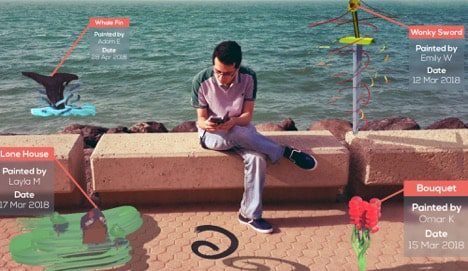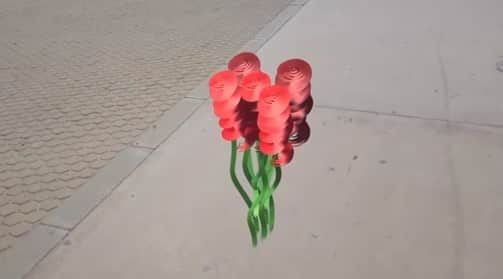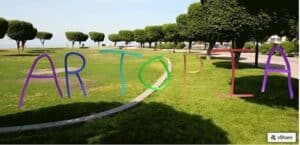We already leave digital traces of ourselves everywhere (you can download your Facebook data if you need to check) but AR paintings and doodles could be next way we leave our mark on the world. Artopia is a fascinating AR app for real-time art creation. You can create and save 3D paintings and leave them for others to see.
Of course, you may already be thinking what we’re thinking – there are incredible opportunities here for education (and retail) in integrating augmented reality designs and information into our environment. And it opens up an ethical quandary of reining in racist and ethical attacks.
Think cyber-bullying is tough now? Just wait until we live in a world of augmented reality.
Your AR paintings in Artopia

According to Tech Crunch, the process for creating the 3D paintings is easy.
You make your art by selecting brushes, colors and so on and moving your phone as you would the brush. Grab objects and move them around, attach them, etc. When you’re done, save it and its precise location is saved to Artopia’s service. Now anyone passing by will be able to see it (a map shows nearby creations) and who made it, give it a like and maybe draw some complementary work nearby.
You’re populating the world with time-stamped objects (with your username) that others can see and respond to. Here’s the Artopia trailer:
Will this AR experience take off?
Augmented Reality is just getting underway – and truthfully, we’ll be limited until we get decent AR glasses from Apple or someone else (Microsoft is also pursuing interesting experiments here).
According to the Irish Examiner, the Egyptian born Kuwaiti creator of the AR app, Omar Khalil, was struck by the overwhelming response when he posted the app announcement on Reddit earlier this week.
I had very little idea whether this was something that people would actually want or if I’m just wasting my time.
Putting the video on Reddit and seeing this overwhelming reaction from a crazy number of people was a massive relief, to be honest!
A year of work and he wasn’t sure the demand for AR paintings and scribbles was there. But now Kahlil sees a wealth of opportunities in education, retail, and entertainment.
What I’m essentially giving them is a tool and whose only limit is the creativity of those using it.
“Shop owners can leave creative virtual ads in front of their shops to attract people in a very cool and novel way. Biology teachers can create labelled 3D diagrams of cells for students to learn more easily. Performance artists can dance while painting at the same time while people are watching live.
We already have Pokemon and Snap, but this is different. You might see it as a form of virtual graffiti, moments of digital creativity that can be unlocked by the public through augmented reality.
And when things go wrong?
With good actors come bad actors with their own agendas. And it doesn’t take too great a stretch of your imagination to picture where that road can take us. Rows of phalluses around someone’s house? Bullying notes floating above a child’s seat in school? Trolls could have a field day with this, making our current social media challenges look simple in comparison.
Omar Khalil is already thinking about how augmented reality can be a force for good or for harm. And according to the Examiner, he
says features to report and remove drawings which are abusive, racist or seek to harm others will be in place before the app is launched.
We’ll have to see how that works. But at least there’s concern for the issues – as opposed to Facebook’s approach (problem? What problem?)
Getting the Artopia App
All in all, this is a fascinating project. And while few of us will want to walk around public spaces holding up our phone up all day to detect digital AR paintings, it’s worth checking out as a forerunner of the future. And if you’re an artist or creative, you need to see what the app can do.
You can sign up to become a beta-tester on Artopia’s website.
And then, as the Artopia site says, go “paint the world.”

Emory Craig is a writer, speaker, and consultant specializing in virtual reality (VR) and generative AI. With a rich background in art, new media, and higher education, he is a sought-after speaker at international conferences. Emory shares unique insights on innovation and collaborates with universities, nonprofits, businesses, and international organizations to develop transformative initiatives in XR, GenAI, and digital ethics. Passionate about harnessing the potential of cutting-edge technologies, he explores the ethical ramifications of blending the real with the virtual, sparking meaningful conversations about the future of human experience in an increasingly interconnected world.

